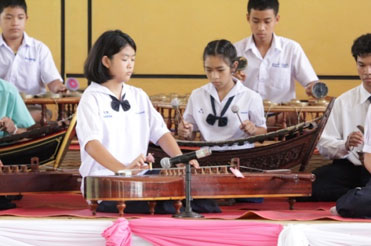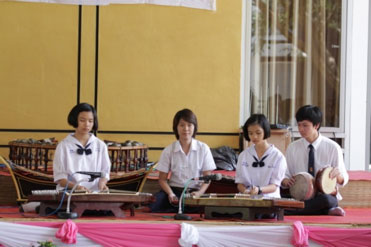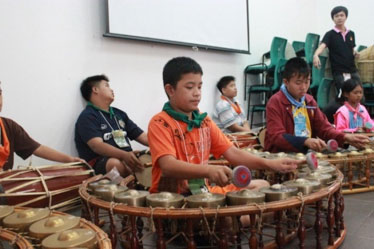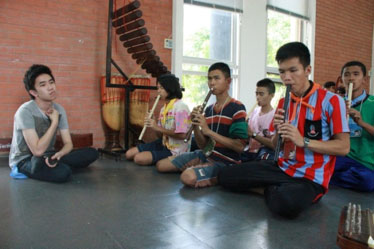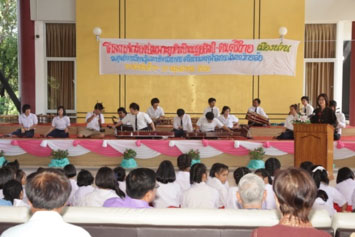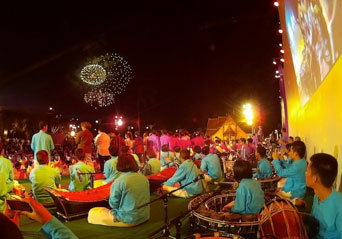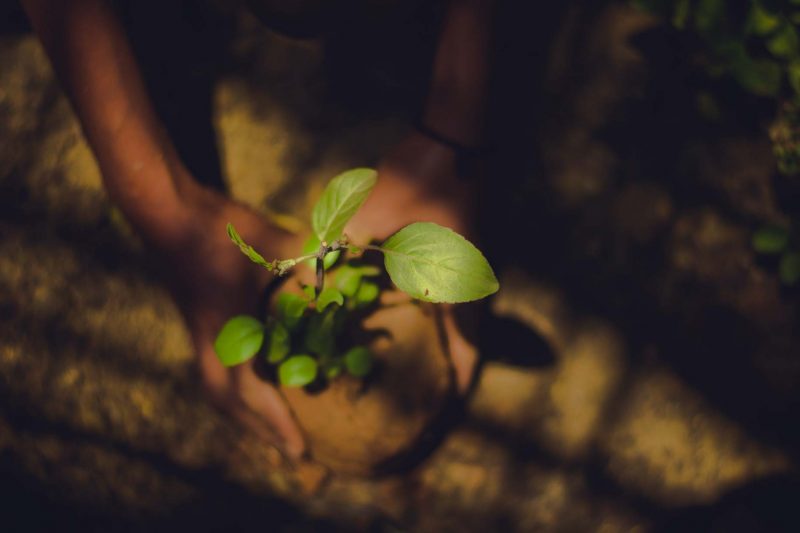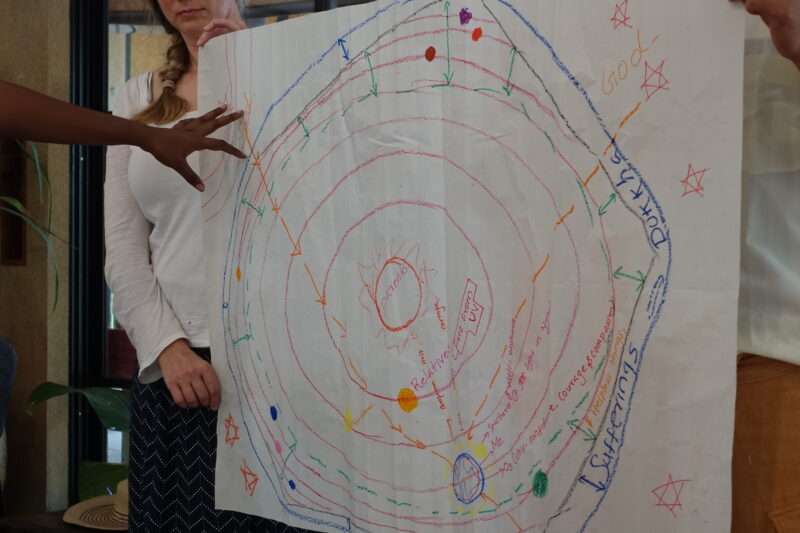Nan Youth Incubation Project for Dance and Music inspires young artists
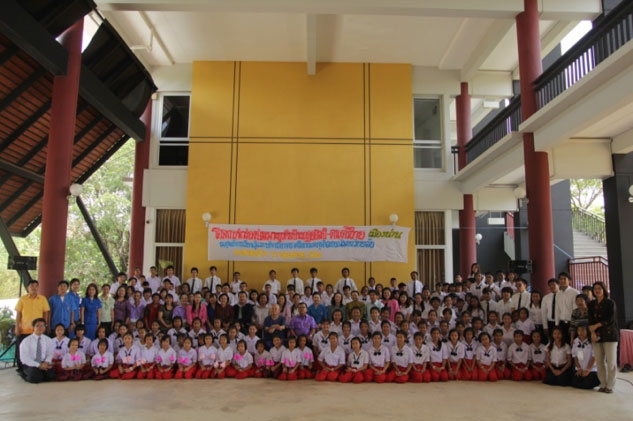
Four years ago, Jatuporn Chaiya and her high school friends in Nan province were busy preparing for their entrance exams. While her classmates relentlessly buried themselves in textbooks hoping to pursue their studies in medicine, engineering or nursing, Jatuporn instead picked up a traditional Thai instrument called a jakhe (zither) to practice folk tunes that most people were not familiar with.
Eventually, it was this crocodile-shaped stringed instrument that led her to be admitted to the Faculty of Fine and Applied Arts at Chulalongkorn University (CU), where many students wish to obtain a seat.
Most people might not view studying the jakhe to play unfamiliar melodies as a very prestigious field compared with medical or engineering studies, as Jatuporn’s friends chose. But upon graduation she will join the hopeful and crucial few with the skills and passion to keep this unique but fading folk music of Nan alive.
Jatuporn is one of the young participants in the “Nan Youth Incubation Project for Dance and Music” held in Nan by the CU Center of Learning Network for Region and the Faculty of Fine and Applied Arts. Since 2013, this music camp has aimed to cultivate, conserve and promote local folk dance and music with its distinctive characteristics. In Nan, it is the Lanna culture passed down for generations in the northern region.
Only Jatuporn and a few friends from the project won admission to the Faculty of Fine and Applied Arts in Bangkok. In the near future, she and her friends will bring their high level of folk music knowledge back to their home province to teach a younger generation of children, ensuring the unique art can be passed on.
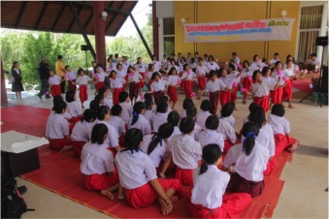
“This training project is like an Olympic camp for Thai traditional music and dance,” says Assoc Prof Dr Pornpraphit Phaosawat, a music teacher with the faculty. “The idea is to provide an opportunity for participants in the camp to meet senior students from our faculty to get to know each other.”
Although the camp lasted only a few days, the music lecturer says the communication between local students and their visiting mentors did not end there because consulting will go on.
“To excel in any instrument, the musicians need to practice and sharpen their skills and this requires time, so both sides will keep in touch for talk and advice,” says Dr Pornpraphit.
Jatuporn agrees the camp was of great benefit to her. “We learned the basic and proper techniques of Thai music from the CU mentors,” she says. “As for me, I’ve also learned proper technical skills for the jakhe from people who were majoring in this instrument.
“We also learned how to hold each instrument properly and which songs to choose for our solo,” she adds. “These were really helpful because on the last day, we took part in both ensemble and solo performances.”
Now a third-year student in the Thai Music Department at the faculty, majoring in jakhe performance, she says the basics she learned from the project paved the way for her to win admission to Chulalongkorn University. “Without it, a country child like me is unlikely to succeed,” she says.
In Dr Pornpraphit’s view, Nan is still a beautiful and peaceful province rich in art, culture and unspoiled nature. Local young people will be a powerful force in preserving it.
“If they realize the value of their own culture, they will cherish and want to protect it,” she says. “The love for their culture is like a cultural vaccine, providing them with immunity to cope with rapid social change. It’s urgent.
“The music camp’s main aim is to enhance their potential and equip them with well-rounded knowledge and deep and proper understanding of their own culture.”
For Jatuporn, learning music is a way to carry on her family’s legacy. “My father is a Thai music master. I’ve always wished to pass on the art to a new generation,” she says.
But the inspiration that propelled her beyond just being a folk music teacher in her hometown to the university level came from her training at the young artists’ camp.
“I got to know many new friends and the chance to learn Thai traditional melodies from mentors and masters,” says Jatuporn.
Preenapha Chaiwut is another student from Nan who drew her inspiration from the project. Now in her third year in the same department as Jatuporn, she is studying khong wong lek (small gong circle).
“I started from zero, but now I’ve become more proficient,” says Preenapha humbly. “When I was in Mathayom 2 (grade 8), I was so happy to study music. I wished to continue studying and to be a part of developing Thai music studies. I took part in music classes right up until I finished my high school years.”
Dr Pornpraphit emphasizes that Young Thai Dance and Music Artists Training Project is an important next step for those who wish to pursue their passion further.
“The musical camp is organized to nurture interested students who would like to pursue higher education in Thai dance and music,” she explains. “Their skills need to be polished as required for the entrance exams.
“After they finish their studies, the university degree will serve as a passport for graduates to work in art and culture fields with more strength and solid fundamental understanding.
“Another essential goal of the project is to conserve, develop, create and build on Thai dance and music thorough fundamental understanding. We would see these children create new tunes by applying Lanna music to contemporary melodies in the future.”
According to Dr Pornpraphit, the camp is the successor to an earlier project aimed at preserving musical traditions. Faculty members for many years have been gathering information on Thai classical artists as well as local musicians in the eastern Lanna region to create a directory. Some of their work was recorded on DVDs for reference.
The research team believed the artistic and cultural traditions of Nan in particular should be conserved and promoted among young people. That led them to set up the Nan Youth Incubation Project for Dance and Music in 2013, and over the years 912 students have participated.
Young people in Nan have responded enthusiastically. Some of them formed an ensemble called Fah Nan, after a song of the same name composed by one of the teachers who participated in the camp. It was one of more than 10 new songs composed and recorded. A Fah Nan community network was then set up as an online learning center and now has 558 members.
After their time at the camp ended, the young performers have continued to receive invitations to demonstrate their skills at various fairs in and out of the province. These include performances at the annual Red Cross Fair in Nan.
The network the young trainees have formed provides a knowledge base and encourages conservation, while inspiring members to innovate further. In the near future we may see coordinated efforts to create new and exciting works. New melodies, new sounds, new bands and new performances are expected to emerge from the blend of Lanna and contemporary music.
The cultural immunity that participants develop will also allow artists to learn and understand their roots. As they become more open to integrating different styles, they will know how to apply cultural traditions in a more sustainable way while conserving and carrying them on.
The CU project has provided the initial inspiration for students to discover and polish their talent and lead them to university study. Now they are ready to join forces to preserve and pass on Nan’s rich culture.
Related articles:
Others

